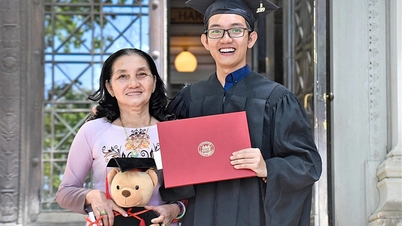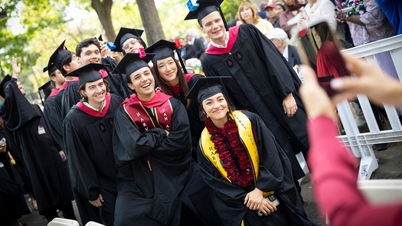Students should consult industry rankings, independent review websites, and connect with international students when choosing a school in the US.
At the workshop "Decoding strategies to conquer the Ivy League and top US universities" organized by SummitEducation Organization on November 12, Ms. Phan Le Hang Giang, Master of Education at the University of Virginia (USA), currently a study abroad consultant, shared how to utilize 6 sources of information to choose the right university.
Overall Ranking
Ms. Giang said that for studying abroad in the US, the US News university rankings are the most popular reference source for university rankings, alongside QS (Quacquarelli Symonds) and THE (Times Higher Education).
Each ranking will have a different set of criteria and weights, comprehensively assessing academic quality, student life or output quality... Therefore, school rankings may not be the same between rankings. For example, Princeton is the top university in the US according to US News but is ranked behind Harvard, Massachusetts Institute of Technology (MIT) or Stanford in global university rankings. However, the fact that a school is often ranked at the top of many rankings means that their brand has a certain level of recognition.
"With these schools, students and parents can rest assured about the quality," said Ms. Giang.
Industry rankings
University rankings in each subject will help students make choices that are closer to their study abroad needs.
For example, at US News , to rank schools that offer Computer Science , in addition to the data collected, they also invite leading experts in the field to evaluate the curriculum as a basis for ranking. Before that, the curriculum at the schools must meet the standards of the prestigious Accreditation Council.
When it comes to the quality of specific majors, some non-Ivy League schools still rank highly. For example, Carnegie Mellon University, which doesn’t make the top 20 nationally, is the second-best in the US for computer science, four spots higher than Ivy League schools like Cornell or Princeton.

Ms. Phan Le Hang Giang at the US study abroad seminar, November 12. Photo: Thanh Hang
School information channel
To find information such as an overview of the university, training programs, student life or admission policies, Ms. Giang said that the school's website is a place not to be missed. In addition, the school's activities are also constantly updated on official social media channels.
Books, websites, admissions consulting forums
College admissions guides are a trusted source of detailed information even for local students. For example, the Fiske College Guide is a series of books updated annually that provides comprehensive information on university rankings, quality, top majors, acceptance rates, and more. It also includes a personal quiz, giving students more information to consider when choosing a school and major.
Additionally, college admissions websites like Princeton Review and BigFuture are also helpful. Students can not only explore their favorite schools and majors, but also get guidance on finances, skills, and careers.
Similarly, Niche or College Confidential are forums where candidates' questions are answered by people who are studying or working at the schools.
On Niche, students can rate schools by rating academics, faculty, dorms, and even food. Meanwhile, College Confidential aggregates questions about college life into topics for members to freely discuss or give advice.
Alumni or current student or employee at the school
Stories from experienced people will help you have more information about the school and the major you want to study. From listening, you can also understand their thoughts or satisfaction with the learning environment.
Ms. Giang said that many American universities encourage applicants to learn about the school in this way. During the interview preparation process, candidates talk to alumni to learn about the school.
Consulting company, Study abroad seminar
According to Ms. Giang, good consulting organizations will update the latest trends in US university admissions, and at the same time understand their students well to guide and support them in their studies and extracurricular activities appropriately. Many units have built a network of excellent international students, creating opportunities for candidates to exchange and learn.
In addition, attending study abroad seminars is an opportunity for students to meet and ask questions to university admissions representatives or speakers. Through this, they learn more about admissions criteria or policies, scholarship opportunities, research, or student life.
Phuong Anh
Source link


![[Photo] Prime Minister Pham Minh Chinh meets the Vietnamese community in Malaysia](https://vphoto.vietnam.vn/thumb/1200x675/vietnam/resource/IMAGE/2025/5/25/1f11d1256d7745a2a22cc65781f53fdc)
![[Photo] President Luong Cuong receives Vice President of the Cambodian People's Party Men Sam An](https://vphoto.vietnam.vn/thumb/1200x675/vietnam/resource/IMAGE/2025/5/25/6f327406164b403a8e36e8ce9d3b2ad2)
![[Photo] Memorial service for former President Tran Duc Luong in Ho Chi Minh City](https://vphoto.vietnam.vn/thumb/1200x675/vietnam/resource/IMAGE/2025/5/25/c3eb4210a5f24b6493780548c00e59a1)
![[Photo] President Luong Cuong receives Lao Vice President Pany Yathotou](https://vphoto.vietnam.vn/thumb/1200x675/vietnam/resource/IMAGE/2025/5/25/958c0c66375f48269e277c8e1e7f1545)


















![[Video] Vietnamese students win first prize in East Asia at global film competition](https://vphoto.vietnam.vn/thumb/402x226/vietnam/resource/IMAGE/2025/5/25/3d525280b49a438793d77319167f53e4)





































































Comment (0)